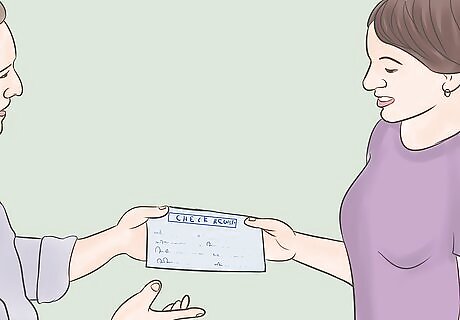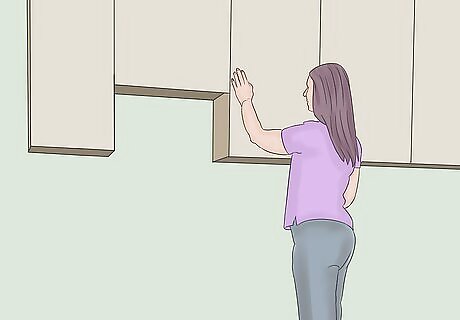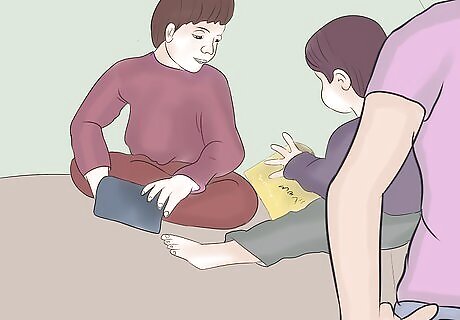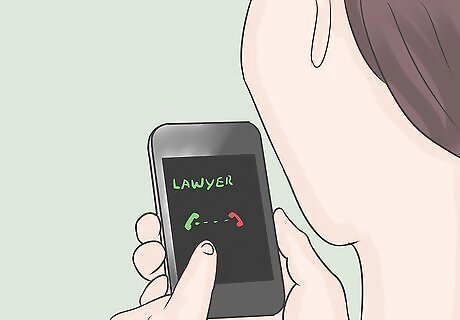
views
X
Research source
This is not a decision that should be made lightly, and it's important to consider your current state as well as your future financial situation before you make a move. But once you decide, it's important to know what steps to take so you can be on your way to emotional and financial strength as soon as you walk out the front door.
Deciding to Leave

Decide that it's time to end your marriage. Deciding to end your marriage is one of the toughest and most important decisions you'll ever make, so it's important that you're 100% certain that your marriage is really over before you start taking the next steps. If you're on this page, chances are that you've already made up your mind, but here are some reasons that your marriage may really be over: If you've already basically uncoupled. This means that you and your husband have separate friends, separate interests, don't spend time with each other, and don't really know what's going on in each other's lives. If your husband is no longer willing to try. If you've repeatedly brought up the problems in your marriage and your husband either promises to change and never does or flat-out refuses to change, then it may be time to leave. If you're in an abusive relationship, then get out. There are no good reasons to stay in an abusive relationship -- or to prolong your pain. If your relationship is truly abusive, then it may be best to get out ASAP and to figure out the rest once you're safe. If one or both of you has been repeatedly unfaithful. It's different if one of you has had a fling and has worked hard never to let it happen again -- but if cheating and flings are the status quo in your relationship, then it may be beyond saving. If you no longer feel like a team. If you have stopped making decisions together, communicating, or compromising, then it may be time to leave. If you can't agree on whether or not to have kids. If you're dying to have kids but your husband refuses, or vice versa, then there may be no point in continuing the relationship if you can't see eye-to-eye on this important matter. See if you can make this decision with a cool head. You should not decide to leave your husband in the heat of the moment, but after you've had some time to really think it over. See if you've tried everything and nothing's worked. If you've tried couples therapy, had many long conversations with your husband, and if both of you have attempted to change your ways but to no avail, then it may be time to leave. But if you've felt dissatisfied for a while and your husband seems to have no idea, it may be worth it to see if you can talk things through first.

Consider having an honest conversation about it. The steps below can help you make the plans you need to make to leave your husband secretly -- letting him know only as or after you walk out that door. This can be helpful if you're not sure how your husband will react, or if you think he'll try to stop you from leaving. But if you're both open to conversations, if he's very supportive, and if you're always honest and open with each other, then you may just want to talk to him first and see if you can work things out. You may be surprised by how many of your feelings your husband shares -- or by the lengths he's willing to go to not lose you. This doesn't mean that you should let your husband convince you to stay. But if you're on the fence and aren't sure if maybe you can really make things work, then talking to him can make a big difference.

Keep your decision to yourself. It may be hard, but this step can be vital in many ways. Leaving a marriage can be a volatile situation and staying quiet will allow you the time to prepare and establish yourself before you actually walk out the door. Tell only a few, close people who support your decision. Tell the people who can give you some help and guidance -- not people who can't keep it to themselves. If you don't want to talk it out with your husband and want to escape a bad situation, then it's better to keep it to yourself so you have time to figure out the details. If your husband knows about your plans and doesn't want you to leave, then he can try to thwart your plans or to make it very difficult for you to get things done. This may seem sneaky, but your goal should be to leave on the best financial footing. You don't want your husband to get in the way of that. It may be hard not to act once you've made your decision, but it could take between two to six months to plan an exit strategy that will help you keep your footing financially. Though you may be ready to walk out that door any second, know that it may be better in the long run if you take some time to get organized before you leave.
Divorce Logistics

Set up a separate bank account. This is especially tricky for stay-at-home mothers who may not have outside income, but having some money saved up will help you move forward on a better financial footing. Starting a separate account, even if you don't have much money to put in there, at first, can help get you on the right track. This will make it easier for you to have your own finances sorted out once you do leave your husband. Taking money from a joint account should be a last resort -- something you do right before you leave.

Find a place to live. If you are leaving the marital home, it is important to find a new place to live. In some cases, temporarily staying with other people can be helpful, but in the long term, you will need to find housing you can afford. This will raise some bigger questions about where you will live -- if you don't have children, it may even be relatively easy for you to move across the country to be closer to your family. Maybe you just want to try something new and want to live in a new climate. Whatever you want to do, having either a plan and a temporary place to stay or even signing a lease at another place can get you closer to your goal. If you and your husband are really on the same page about the divorce and are comfortable enough with each other to talk about it, then you can talk about who is going to move out of the home you share together. If there are children involved, this can be an even more important question. As soon as you've made your decision, try to save money for the move, regardless of whether you're moving across town or across the country. You'll likely find yourself on a stricter budget after you leave.

Get your paperwork together. Throughout a marriage, you will accumulate many important documents such as paperwork pertaining to your mortgage, vehicle and retirement plans, among others. Make sure you have a copy of these documents since the property in question could be an issue in the divorce. If you see many documents that you're sure if you'll need, then you should make a copy of those just in case they end up being important. It's better to be safe than sorry when it comes to getting your paperwork together. If you really want to make thorough copies of everything, then you may want to hire a professional to make a copy of your home computer's hard drive and even to take photos of certain valuable belongings. This can help you in the future if some money goes "missing" during your settlement.

Make a plan for your children (if you have any). If you and your husband have children together, then it's important to figure out what's best for them. Do you think your husband is a great (or at least decent) father who will be involved in his children's lives, or do you have reasons to believe your children should have nothing to do with him? This will be one of the biggest decisions you make throughout the process. Just keep in mind that you can't just decide your children shouldn't see your husband because you don't want to see him anymore. There should be a good reason (like alcohol abuse) to keep him away from his kids. You should make this decision with an even head, because it will determine many things, such as, potentially, the place where you live, as well as your children's futures.

Contact a divorce lawyer. A divorce is costly and time consuming, so you may wish to shop around for a price you can afford, especially if you think it will be a drawn out process. Though you may be tempted to save money and to do this yourself, the right lawyer can really help you make the process easier and less painful. You don't want to end up getting embroiled in a financial mess you don't know how to fix just because you didn't want to spend money on a lawyer. If you really don't have the budget for this, then you can consider hiring a paralegal.

Start planning your post-divorce budget. If you're doing incredibly well financially already, then this is definitely a bonus, but it's important to consider the budget you'll have after you leave your husband. It's important to ask yourself these questions before you walk out the door so you don't feel stumped when the time comes. Unfortunately, studies show that many women have to deal with a 1/4th or even a 1/3rd drop in their standard of living after a divorce; however, don't let this discourage you! If you make a solid plan, you'll work through it. Here are some things you'll have to figure out: What new expenses will you take on? Where will you cut back? How much more will child care cost (if you have children)? How will you earn the income that you need?

Don't depend on alimony. Alimony or child support could definitely be a part of your future income, but in today's economy, it may not be a guarantee. If you're certain that your husband will pay reliably, that's one thing, but you have to ask yourself if you can really count on your husband. This can get even trickier if you're the main breadwinner, because then you will be the one paying alimony.

Establish your own credit record. If you don't have a credit record apart from your spouse, then it's important to get one as soon as you can. You can start by getting a copy of your credit report; you can get at least one free copy a year from each of the three bureaus at AnnualCreditReport.com. Check it out and look for errors. Then, begin to build your own credit by making wise purchases, making payments on time, and being thoughtful in your money-management. You may think that you have a strong credit record just because your husband does, but this may not be the case if you have not been very involved in the financial aspect of your lives.

Make plans to boost your income. After you have a better sense of the budget you need to live on, then you have to think about whether or not you need to boost your income to cover it. If you have a well-paying job and plenty of savings, then great -- but if you need to get a job and have spent time out of the work force, or if you need a higher-paying job, then you'll need to make moves in that direction. This doesn't mean you should become CEO of a new company before you leave your husband, but you can make some moves to make it easier to boost your income once you do leave. Here are some things you can do: Take classes that help you specialize in necessary skills for getting the work you want, whether you need to brush up on your computer skills or to get certified in a specialized form of training. Buy a new suit so you are interview ready when the time comes. Get your resume in order. You don't have to send it out before you leave your husband, but you should have it on hand when the time comes. Once you leave, you are likely to feel even more overwhelmed, and you may not have the time or mental strength to do something like update your resume.
Moving Out

Pack your belongings. You may choose to start with the smaller, less obvious items or you may decide to do it all in one day. You must determine what the safest approach is for your situation. If you think your husband is going to get violent or threatening if he sees you packing up your things, make a plan to do this when there's little chance he'll be around. Still, though, it's best to have some friends or family members there to help you for your own safety and protection. It can be helpful to pack when your husband is at work. Even if he supports you in leaving, packing when he's around can be more painful.

Leave. You may have already told your spouse you are leaving or it may come as a complete surprise. Even if you know you have made the right decision, this last step may be the hardest emotionally. Of course, every situation is different. If you and your spouse have been talking about this for months, then it may not come as a shock. If you're in an abusive or threatening situation, then leaving suddenly is your best option. Whatever your reason for leaving, it's up to you to decide which method of leaving is best -- whether it's a frank and honest conversation or leaving without a note.

Get as much emotional support as you can. This is not the time to be alone with your worries. After you leave your husband, you should lean on your family, your friends, or even a therapist, as much as you can. This is likely the hardest thing you'll ever have to do, and the pain will be much more manageable if you have the support and love of the people who care about you the most. There's no shame in asking for help. Though it's important to get some alone time to deal with your feelings, it's equally important to be out and about, to make plans with your friends, and to indulge in long conversations. Don't be afraid to call up old friends to ask for help or just to chat. They'll understand that you're going through something very difficult and will support you all the way. Unfortunately, not everyone may be on board with your plan and you may lose some friends or family support in the process. Don't let this stop you from being firm in your decision, and know that your decision can lead you to build new and rewarding friendships.

Get back on your feet. This may not happen overnight. You will have to recover both emotionally and financially, and it can take years for you to feel independent and in control of your life again. The important thing is that you know that you are on the path to recovery, and that the decision you made will lead to more happiness in the long run, even if it may not feel that way now. And once you've gotten back on your feet, you can praise yourself for having the strength to decide to leave your husband, and for following through on your ideas. Though women tend to lose financially after a divorce, this does not keep them from exploring new things they never knew they loved, advancing in their careers, or doing many amazing things that they were not able to do during their marriage. In the long run, you should be able to not only get back on your feet, but to become a stronger, wiser, and more fulfilled person in the process.




















Comments
0 comment